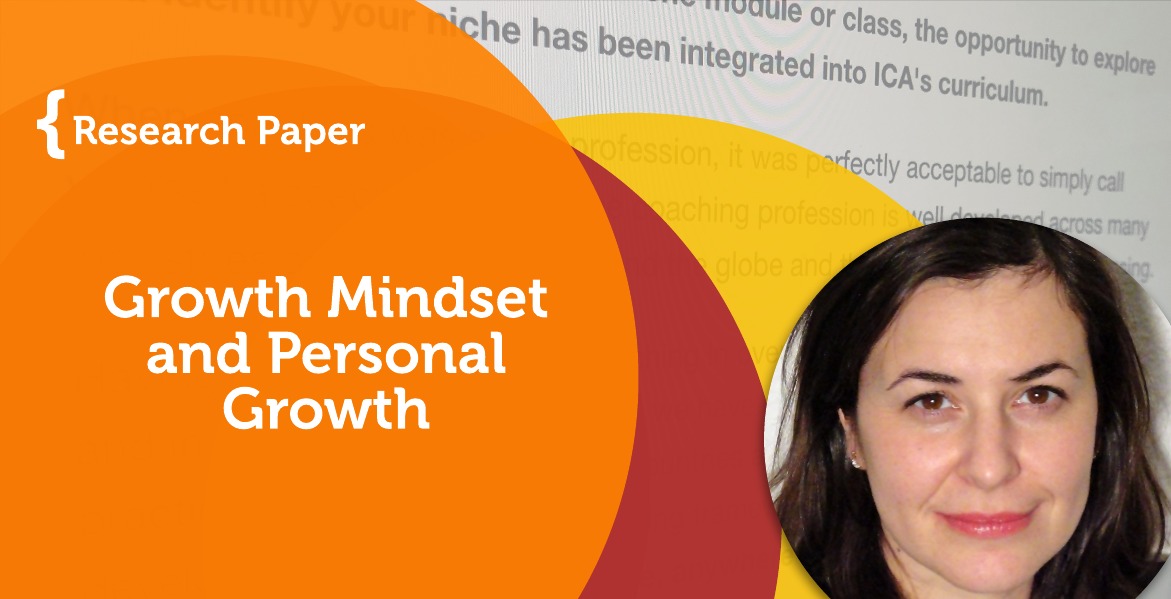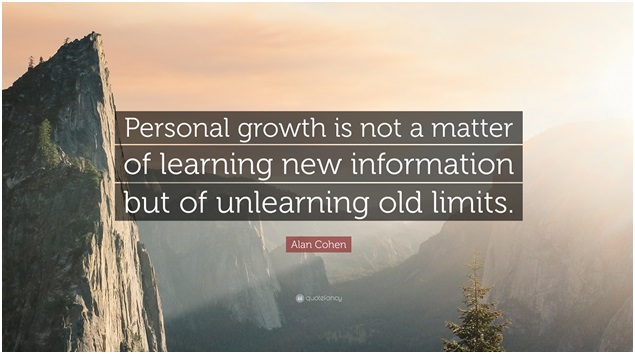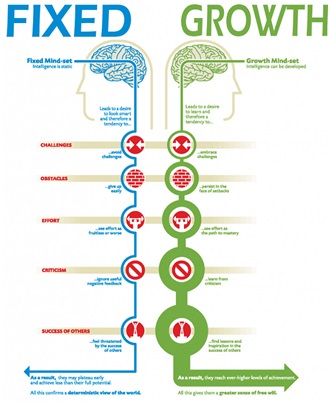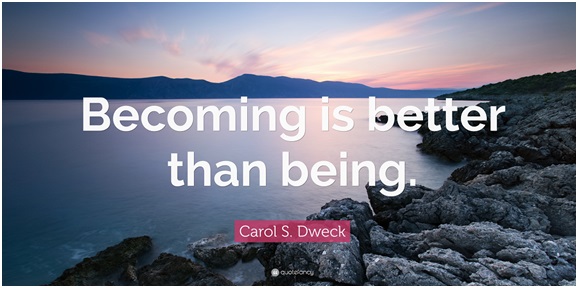 Research Paper By Florina Cristina Schiopu
Research Paper By Florina Cristina Schiopu
(Transformational Coach, GERMANY)

Personal growth may become an important topic for each of us at any moment in time. It shows when we realize the need to live our life with purpose, authenticity, and showing concern towards others.
Personal growth can be referred also as self-improvement and self-growth.
It is a process that requires an open mind, motivation, the desire to improve, to learn, but also the willingness to get out of the current comfort zone, and even to feel sometimes uncomfortable. It also implies to strive to make changes.
Personal growth is possible if we are willing to develop a positive mindset, a growth mindset.
According to the Merriam Webster dictionary, one definition of growth is“progressive development” and mindset is defined as“a mental attitude or inclination”.
The logical conclusion is that having a growth mindset means having a mental attitude that leads to progressive development.
The growth mindset has its roots in the Mindset Theory. At the base of the theory sits the idea that our beliefs influence the way we respond to life’s situations. The theory premises start from the way we assess our capabilities, talents, and intelligence and their impact on our lives and success. (Murphy & Dweck, 2016).
Over 30 years ago, ProfessorCarol Dweck and her colleagues studied the behavior of thousands of children on learning and they defined terms as fixed mindset and growth mindset to describe the underlying beliefs about learning and intelligence. The study demonstrated that understanding the need of putting in extra effort and time in our endeavors can lead to higher achievement.
Fixed Mindset
A fixed mindset describes people who believe that intelligence, talent, or natural-born skills are enough to lead to success and these cannot be improved.
People with fixed mindsets may avoid challenges, give up easily, and ignore useful feedback.
Growth Mindset
A growth mindset describes people who believe that can get better at something or succeed by the dedication of time, effort, and energy. People with a growth mindset embrace challenges, overcome obstacles, learn from feedback, and seek out inspiration, that can contribute to their success.
The difference between the two mindsets is that one view doesn’t support change, while the other support opportunities for improvement and can lead to change.
Understanding the benefit of cultivating a growth mindset can be very powerful and willingness to put in extra time and effort can lead to achieving desired goals. This can contribute to a fuller, more meaningful life.
 https://www.mindsetworks.com/science/Impact
https://www.mindsetworks.com/science/Impact
The dominant mindset can show on handling a task, a project, or a situation.
We can choose to tell ourselves that we cannot handle it, we do not have enough abilities, we are not trained to do that we will find excuses not to handle it. We can choose also to see it as an opportunity to learn something new, to improve our skills, to search for resources and support to handle the topic, and finally to grow.
The growth mindset can lead us in acquiring new skills, new knowledge, and step into new areas of expertise.
How can the growth mindset be cultivated?
Personal growth is a continuing process. Cultivating a growth mindset can be very empowering and can boost our confidence to try new ways, determine us to concentrate our efforts on desired outcomes, and move us one step forward towards achieving what is meaningful to us.
By knowing precisely what we want to achieve, we can think about what skills can we use, what else do we need to learn, when is the right time to start; we can estimate how much time do we need and where do we want to concentrate our efforts. We would be able to deal with problems and challenges, to spot the distractions or barriers that might stop us or lead us astray. We move on the path to growth, learning, self-esteem, and confidence.
Self-reflection:
Coaching Application
Coaching serves us to explore a new path or to navigate through new circumstances.
The coaching space is set for us to explore the many perspectives that we experience in life, to enhance our skills and resources, to discover the answers within ourselves.
During the coaching journey, you can explore how you look at the world, what inspires you; you can achieve clarity and you can understand what ideas or thoughts might be blocking our progress.
You will begin to see and think through things in a clearer and more balanced way:
- Where am I now?
- Where do I want to be?
- How can I get there?
ICA Coaching Power Tools for personal growth empowerment
Reframing is an important part of the coaching process. It’s about creating a shift and seeing new perspectives. We can look at a situation, analyze it, discern, and re-frame perspectives. However, a coach is an objective observer to our situation and can help the client, to identify unhelpful perspectives, and to support him to re-frame them. (ICA Reframing perspectives)
During the coaching process, the client is supported to lighten his current perspective, he will be able to step back, take some distance, and gain greater clarity on the situation. The clients present in the moment, free of judgments that can bind him to old ways of thinking. Discussing the worst-case scenario enables shifting the view from significance to lightness. (ICA Lightness vs Significance)
We can create a powerful platform for sustainable personal and professional growth if we start from a self-trust perspective. Often, we give space to doubt, as we let the judgments about ourselves prevail and hold us back. To trust ourselves we need to know what our beliefs are, our values, and our purpose. The coach is partnering with the client to explore and find ways in which they can create a perspective of trust. (ICA Trust vs Doubt)
Blame keeps us from fully enjoying and engaging in our lives. When we view responsibility as a privilege, instead of as a burden, we awaken many possibilities for change and growth. Using a powerful question, the coach can support the client to consider his role in the situation, and thus taking a big step towards becoming responsible. (ICA Responsibility vs Blame)
Action is the foundation needed to push us forward to achieve our goals. It is the path to growth, learning, self-esteem, and confidence. Negative judgments about ourselves can pull us back and keeps us stuck, choosing to delay instead to act. The coach can support the client to explore a different point of view and thus creating a new way of looking at the situation. By using powerful questioning, the coach can support the client to move from a dis-empowering to an empowering perspective. The client can decide to turn concerns into action. (ICA Action vs Delay)
Exploring our underlying beliefs and what we are truly committed to, we can realize that we have choices. Following through on commitments and act upon, instead of only trying gives us the desire to change. When we are determined to commit to our values, our vision, we are more likely to view these as learning opportunities and keep moving forward. In the process, we will build confidence and self-trust. Working with the client, the coach will need to support him in understanding what he wants to commit to. The coach’s role is to support the client to see the importance of aligning his own beliefs with the desired pathway forward. (ICA Commitment vs Trying)
Some thought-provoking questions to support the client in moving forward:
Having a growth mindset cannot be considered the solution to every problem; however, choosing to make the extra effort to build a growth mindset will likely make it easier and more enjoyable to work hard, it will give you the confidence you need to act towards your goals.
A growth mindset means to embraces challenges, to persists in the face of setbacks, take responsibility for actions, and acknowledge the required effort and time.
By taking the value of coaching into your life, you will be able to extend permanently your growth zone. You will eventually set new goals.

Resources:
Dweck, C. S. (2006). Mindset: The new psychology of success. New York, NY: Random House Publishing Group
Briggs, S. (2015). 25 ways to develop a growth mindset. InformED. Retrieved from
https://quotefancy.com/growth-quotes
https://www.merriam-webster.com/dictionary/mindset
https://www.merriam-webster.com/dictionary/growth
https://www.mindsetworks.com/science/
https://tophat.com/glossary/g/growth-mindset/
https://positivepsychology.com/growth-mindset-vs-fixed-mindset/
https://positivepsychology.com/mindset-activities-tests/
https://www.psychologytoday.com/us/blog/click-here-happiness/201904/15-ways-build-growth-mindset
ICA Power Tools: Reframing perspectives; Lightness vs Significance; Trust vs Doubt; Responsibility vs Blame; Action vs Delay; Commitment vs Trying
Florina Schiopu: Coaching Model – Take the Leap
Florina Schiopu: Power Tool – To Live a Dream vs. To Have a Dream